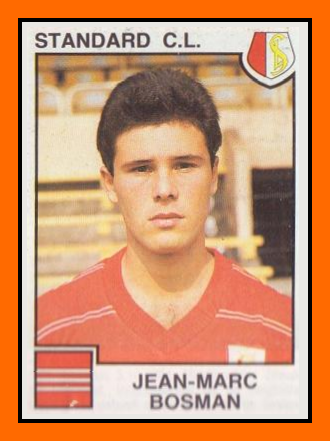Within the transfer rumor mill, you might have heard that the club you support is signing a player “on a Bosman.”
If you’re not an avid soccer fan, this phrase will likely seem totally alien to you. Well, the story behind it involves legal battles which go all the way to the European Court of Justice, resulting in spiraling personal circumstances for the protagonist.
The subsequent ruling influences player power, inequality between clubs, and quotas on foreign players even to this day. One man’s impact on the transfer market was perhaps more significant than anybody else’s: Jean-Marc Bosman.
The man at the center of it all

As a child, Jean-Marc Bosman looked out of his bedroom window, dreaming of one day playing for the club whose stadium his house was in the shadows of. While he reached those Standard Liège aspirations, he could never have imagined being remembered for what was to come.
Bosman is better known for the legal ruling named after him than for his soccer career. That’s not to disservice the man; the Belgian player had talent. In fact, he won the best player at an Under-21 tournament and captained his nation at youth level.
Bosman spent the first five years of his professional career at the aforementioned Standard Liège, consistently plying his trade in the Belgian top division.
Yet, in 1988, he was transferred to local competitor RFC Liège, and it would be fair to say that his time there was underwhelming, making only three appearances in two seasons. His contract was ending, and he envisioned his career elsewhere.
Bad blood
Now, this is where things get messy. In 1990, Jean-Marc’s contract at RFC Liège had expired. As a result, he found himself on the transfer list.
In those days, you couldn’t just pack your bags and bid farewell once your contract was up. Departures still had to be rubber-stamped by the club, who would either agree to let you go for free or by receiving what they deemed to be an acceptable fee.
Player power was non-existent back then. Running down your contract served no purpose. The idea of a pre-contract wasn’t even conceived. It’s astonishing to consider really, but this was commonplace in soccer.
RFC Liège demanded a fee from French club Dunkerque, a club Bosman was keen on signing with, which was quadruple what RFC had paid to take Bosman from Standard Liège. An absurd amount when you consider his paltry appearance time for RFC.
Dunkerque couldn’t afford that figure, but it was Bosman who bore the brunt of the move’s failure. He was cast aside to the reserves and forced to take a wage cut because he was no longer a first-team player.
His restructured deal was only worth a quarter of what he was previously earning – the lowest legally allowed under Belgian soccer laws at the time.
Jean-Marc put it fairly succinctly himself: “they thought that I had become four times better if I wanted to leave and four times worse if I wanted to sign again for them.”
As you can imagine, Bosman was perplexed. Players really seemed to be owned by clubs, in the most literal sense of the word. The midfielder was fed up. He felt his rights were infringed, not just as a player but as a person.
From the pitch to the courtroom

This was when Jean-Marc Bosman issued lawsuits against three different parties: RFC Liège, the Belgian FA, and UEFA. He and his legal team did so on the grounds that, as a citizen of the European Community (which became the European Union), he should be able freely to move from one employer to the next once his contract had finished, which the current soccer laws didn’t allow for. Predictably, RFC Liège suspended Bosman.
It was a process that his lawyer thought would only last a couple of weeks. Painstakingly for them, they had to endure five years of legal battles until the final ruling was made. Did Bosman have a successful soccer career during this period? Not quite. He made a handful of appearances for an amateur French team and a pacific island club.
Ultimately, the European Court of Justice decided in favor of Bosman.
It was a verdict that reverberated around the soccer world and has considerably altered the way the transfer market operates. This ruling meant that when a player has under six months remaining on their contract, they can agree to a pre-contract elsewhere, with their current club receiving no fee.
Thus commenced a tidal wave of free agents constructing lucrative deals with clubs, a new and revolutionary facet of soccer.
Reflecting on what occurred, Bosman had a bad feeling about the remainder of his soccer career when the legal battles began but persisted anyway, knowing that he was fighting for individual liberty. Besides, there wasn’t exactly a queue of other players waiting to take on these big organizations; he knew somebody had to make a stand.
Show me the money
Many of the world’s biggest names have since been involved in Bosman deals, or free transfers as they’re commonly known: Lionel Messi, Michael Ballack, Andrea Pirlo, Raúl, Zlatan Ibrahimović, Cafu, Robert Lewandowski, Paul Pogba… the list goes on and on.
What Jean-Marc Bosman, and probably many others at the time, didn’t realize is that when that ruling was made by the European Court of Justice, agents would soon come sniffing around to negotiate the best possible deals on behalf of their clients while taking a handsome cut to do so.
Why? Because players finally had some control. No longer were they the property of their clubs, left to rot in the reserves on reduced wages if relationships soured. Soccer players now had a bargaining chip in their negotiation tactics.
Here’s a hypothetical example: Roberto Firmino has one year left on his Liverpool contract. Let’s say he wants a pay increase. If Liverpool say they’re not willing to meet his wage demands, he may want to leave right now.
Liverpool could just say no and leave him as an outcast for a season, but the Bosman ruling meant that when his contract expires, Liverpool has no control over his future anymore.
Therefore, Firmino and his agent might remind the club that they can still command a fee for him now and could free up some of their wage bills early. Whereas, in six months’ time, they risk him signing a pre-contract elsewhere and losing out on millions in transfer fees.
Now, if Liverpool wish to retain Firmino but wants to keep the wages stagnant or reduced, Roberto’s most likely tactic would be to use the prospect of earning more money with another club as a negotiating tool. Again, this was only possible because of Bosman.
Consider the savings made by clubs who don’t have to pay transfer fees for free agents – where does that money go?
Frequently it’s part of the leverage that a player and his negotiating team will use to further increase their salary or include a signing-on bonus. Negotiations are now tilted in favor of the player, it seems, rather than towards the club as before.
Dilemmas are created for clubs, which was unthinkable before Jean-Marc Bosman’s subversion. The complexities to consider within negotiations for all players, ranging from undoubted star players to those not even in the manager’s consideration, shows how different the game is 27 years on from the Bosman ruling.
Financial inequality in soccer dates back to the 19th century (Netflix’s mini-series ‘The English Game’ wonderfully dramatizes the intricacies involved with the early days of paying players), but, to paraphrase Jean-Marc himself, the wealthiest clubs could now widen the gulf between themselves and clubs with fewer resources to a level never seen before.
Crossing borders
Jean-Marc Bosman and his actions have been accredited as a catalyst for the exorbitant figures that soccer players now receive, but there was another effect that came from that ruling. Clubs within the European Union could now register any number of players who are European Union citizens as they wish.
Last season’s statistics suggest that only 41.2% of all Premier League players are English. That figure is actually an increase on the figure from nine years ago, which was 34.2%.
These figures were not possible before the Bosman ruling, as restrictions limited the number of foreign players in squads. The rule throughout Europe at the time stated that squads could only register three foreign players, plus two more but only if they came through their youth academy.
Famously, Sir Alex Ferguson had to omit Peter Schmeichel from his squad for a 1994 trip to Barcelona in the Champions League to avoid breaking the rules on foreign player quotas.
Curiously, UEFA deemed Scottish, Welsh, and Northern Irish players as “foreign” for English clubs, despite being member states of the UK, because they had respective football associations.
We may never have seen some of the great teams that leagues globally have been blessed with were it not for Bosman sacrificing the prime years of his soccer career for challenging his club and the governing bodies facilitating such mistreatment, holding him to ransom.
No fairytale ending
Bosman got what he’d set out to achieve from the legal battles, but it cost him dearly.
His prime playing years were gone, thus losing any further income he’d earn from professional soccer. The handsome compensation he received from the lengthy trial didn’t last long.
Sadly, Bosman’s marriage unraveled amid the ongoing trial. He then developed an alcohol problem. The men he once shared the field with no longer wanted to associate with him out of fear for their livelihoods. There was even a criminal charge brought against him for an unsavory incident.
Though his cause was noble, the subsequent damage to his personal life was profound. He has previously relied on hand-outs from FIFPRO, the organization which represents professional players.
Although the feeling of obligation isn’t universal, it remains a sad state of affairs for a man who contributed to the wealth and freedom of so many who succeeded him in soccer.
Those childhood dreams he strived towards will, unfortunately for him, not be what Jean-Marc Bosman is remembered for. Whatever happens with Bosman in the future, his name is indelibly inscribed into soccer parlance, and his legacy of defiance will remain untouched.

